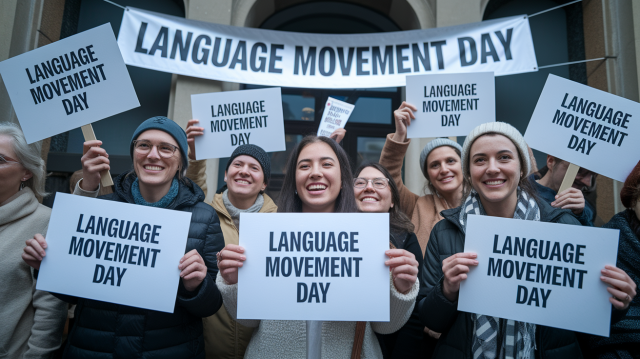Language Movement Day, observed annually on February 21, is a day of profound significance in Bangladesh. Known as Shaheed Dibosh (Martyrs’ Day), it commemorates the sacrifices made during the Bengali Language Movement of 1952, when students and activists gave their lives to protect their right to speak and preserve their mother tongue, Bangla. In 2025, this day continues to hold deep cultural and historical importance, not only in Bangladesh but also globally, as it coincides with International Mother Language Day, established by UNESCO to promote linguistic and cultural diversity.
Why Is It Celebrated?
Language Movement Day is celebrated to honor the martyrs who fought against the imposition of Urdu as the sole state language of Pakistan, advocating for the recognition of Bengali (Bangla) as one of the state languages. Their struggle symbolizes the right to linguistic and cultural identity, serving as a reminder of the importance of protecting mother tongues and promoting multilingualism worldwide.
Cultural Significance
This day reflects the deep connection between language and cultural heritage. In Bangladesh, it is observed with solemnity and pride, highlighting the role of language as a cornerstone of national identity. The day also resonates globally, inspiring efforts to preserve endangered languages and celebrate linguistic diversity.
Social Impact
Language Movement Day fosters unity among Bengali-speaking communities and serves as a source of inspiration for other linguistic movements around the world. It underscores the importance of respecting linguistic rights as a means of fostering inclusivity and social harmony.
The Importance of It
The significance of this day lies in its broader message about the power of language to shape identities, foster cultural pride, and unite people. The sacrifices made during the Bengali Language Movement remind us that preserving linguistic diversity is essential for maintaining global cultural heritage.
Educational Value
Language Movement Day provides an opportunity to educate people about the history of the Bengali Language Movement and its impact on global linguistic rights. Schools, universities, and organizations often host discussions, exhibitions, and cultural programs to highlight the importance of mother tongues in education and society.
Emotional Connection
For many Bangladeshis, this day evokes deep emotions as they pay homage to those who laid down their lives for their language. The Shaheed Minar (Martyrs’ Monument) becomes a focal point for tributes, with people laying flowers and reciting poems in memory of the martyrs.
The Origin of It
The origins of Language Movement Day date back to February 21, 1952, when students in Dhaka protested against Pakistan’s decision to impose Urdu as the sole state language. The movement culminated in tragic violence, with several demonstrators losing their lives. Their sacrifice eventually led to Bengali being recognized as one of Pakistan’s state languages in 1956.
Historical Events
- 1947: Partition creates East Pakistan (now Bangladesh), where Bengali speakers form a majority.
- 1948: Urdu is declared Pakistan’s sole state language, sparking protests.
- 1952: Students in Dhaka organize demonstrations; several are killed on February 21.
- 1956: Bengali gains official recognition as one of Pakistan’s state languages.
- 1971: Bangladesh achieves independence, with Bangla becoming its national language.
Evolution Over Time
Initially observed locally in East Pakistan (now Bangladesh), Language Movement Day gained national recognition after independence in 1971. In 1999, UNESCO declared February 21 as International Mother Language Day, broadening its global significance.
How to Celebrate
- Pay Tribute at Shaheed Minar: Lay flowers at memorials honoring language martyrs.
- Participate in Cultural Events: Attend poetry recitations, music performances, or storytelling sessions celebrating Bengali culture.
- Promote Multilingualism: Organize workshops or discussions on preserving endangered languages.
- Teach Younger Generations: Share stories about the sacrifices made during the Bengali Language Movement.
- Raise Awareness Globally: Use social media platforms to highlight the importance of linguistic diversity using hashtags like #LanguageMovementDay or #MotherLanguageDay.
Conclusion
Language Movement Day is a powerful reminder of the sacrifices made for linguistic freedom and cultural preservation. As we honor this occasion on February 21, 2025, let us reflect on the enduring importance of protecting mother tongues and promoting linguistic diversity worldwide. This day inspires us all to embrace our linguistic heritage while fostering respect for others’ cultural identities.












